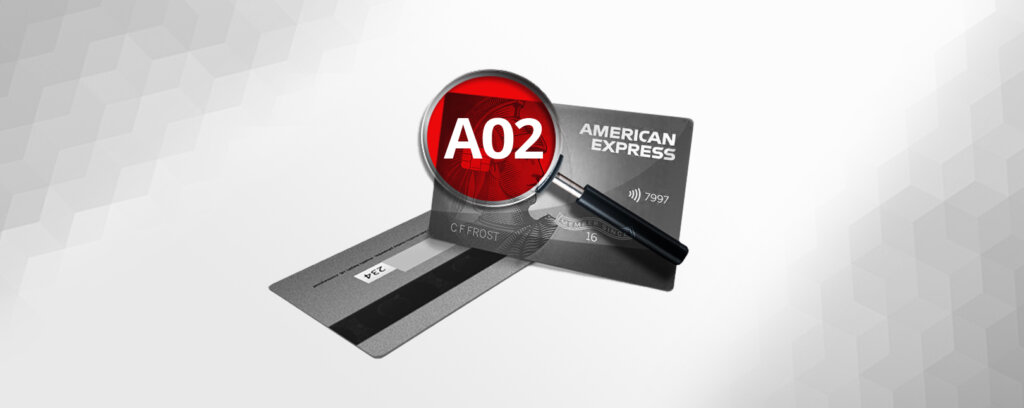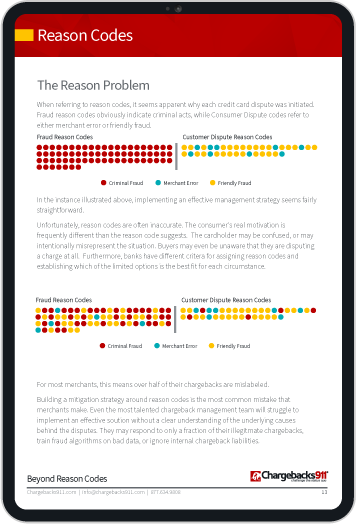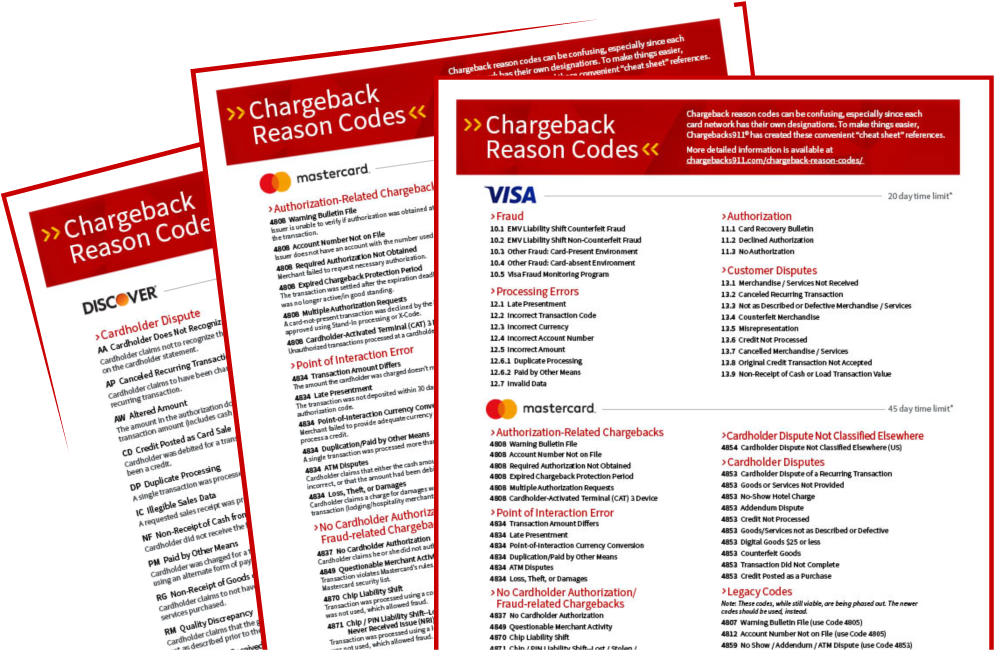
How to Handle Amex Reason Code A02 Chargebacks
American Express breaks down the acceptable causes for a customer to dispute a credit card transaction in their dispute guidelines. This is done for the sake of simplicity and standardization.
Each chargeback trigger has a designated “reason code.” Amex can then assign the appropriate code to each case to show the given reason for the chargeback.
Learn more about Amex reason codes
Today, we’re looking at one reason code in particular — A02— and exploring the causes, timeframes, fees, and other specifics. We’ll also explore what you can do to prevent these chargebacks from happening.
Recommended reading
- What is Wire Fraud? How it Works | Examples | How to Avoid
- Issuer Declines: 7 Reasons They Happen & How to Fix Them
- What Happens if You File a False Chargeback Claim?
- Chargebacks911® CEO in New Feature for Grocery Trader Magazine
- Rapid Dispute Resolution: Avoiding Chargebacks With RDR
- Chargebacks911® CEO Featured by Tampa Free Press
What is American Express Reason Code A02?
American Express chargeback reason code A02 is “no valid authorization.” This reason code is used to explain that the charge you submitted did not receive valid authorization approval, was declined, or the card has expired.
Reason code A02 signifies a transaction that was not authorized correctly, leading the cardholder to contest the responsibility for payment. This dispute may stem from mistaken charges, or an oversight by the merchant.
Transactions might go through without proper authorization for several reasons. For instance, merchants might proceed with transactions after authorization is denied. They might also try to run a transaction with an expired card, or skip the authorization request process entirely. Engaging in such practices is highly risky and not recommended.
If merchants contend that a chargeback with reason code A02 is unwarranted, they might succeed in overturning it by presenting strong evidence in their favor. Merchants will likely lose the dispute unless they can very definitively demonstrate that they obtained the necessary authorization, though.
What Caused This Dispute?
Amex chargeback reason code A02 is primarily issued when you fail to attain valid authorization for an Amex charge. To demonstrate, this scenario can arise if:
- The transaction you submitted was not the same as the one for which you received authorization (i.e., numbers were transposed).
- An incorrect authorization approval was received, or it doesn’t correspond to the charge in question.
- The card in question had already expired at the time at which authorization was requested.
Usually, if a transaction isn't authorized, a merchant's point-of-sale system or their payment processor will put a stop to it right there. But, there are ways to get around this and “force” a transaction through, skipping over the whole authorization part. When that happens, it can trigger a chargeback under reason code A02.
There could be times when skipping authorization might look like the right move. However, it's never really advisable. There are merchants out there who might take advantage of this to charge a customer's card without permission, and fraudsters might do the same to pull off transactions for their own benefit. This is exactly why this chargeback reason exists.

How to Respond to Amex Reason Code A02 Chargebacks
So, what happens if you can prove that valid authorization was attained?
Naturally, if you receive an Amex A02 chargeback, you’ll want to resolve the issue right away. If you feel that the chargeback was filed in error, you should file a dispute response. This is done through a process called representment.
Representment is the process through which you’ll challenge a chargeback. You provide evidence to the card issuer (in this case, American Express) that all aspects of the transaction were legitimate and in accordance with the card issuer's policies. This can involve several key pieces of evidence.
Also, remember that there’s a strict time limit to consider. You have just 20 days in which to submit your response to American Express. However, this time frame also includes the time it took for your acquirer to provide you with a dispute notification, as well as time spent by the acquirer reviewing and submitting your case. In practical terms, you’ll often have five days or less in which to prepare and submit your response.
Acceptable Evidence for Amex Reason Code A02 Responses
You can re-represent these charges under the condition that you have compelling evidence.
For American Express reason code A02 chargebacks, you’ll want to provide three key pieces of evidence that will help overturn the dispute. These include:
- Proof of Valid Authorization: This would be any documentation showing that you obtained valid authorization for the charge in question.
- Proof of Credit Offset: This is proof that you have already issued a credit to the buyer to try and avoid the dispute. In this case, you’ll need to offer proof that you already provided a credit to offset the amount charged.
- Proof of Valid Card Date: This would be evidence that you charged the card before the expiration date was reached, or well within the active dates on the card.
The success of representment depends on the thoroughness and relevance of the evidence provided. Maintaining detailed records of transactions and communications with customers is vital to effectively counteract all chargebacks, including those under reason code A02.
How to Prevent Amex Reason Code A02 Chargebacks
As the old adage goes, “an ounce of prevention is worth a pound of cure.”
You may never be able to stop chargebacks entirely. But, you can limit your exposure to risk and keep your chargeback ratio in good standing by adopting a few best practices. Generally speaking, you’ll want to:
#1 | Comply with Authorization Specifications
Ensure all requests for authorization approval strictly follow the technical and procedural requirements set by payment processors and card networks. Proper compliance minimizes the risk of transactions being declined or disputed later on.
#2 | Get Valid Authorization
Always include a valid authorization approval when submitting charges for processing. This serves as proof that the transaction was approved by the cardholder's bank, safeguarding against unauthorized transaction disputes.
#3 | Respect Declined Authorizations
If a transaction is declined during the authorization process, don’t attempt to submit it. A declined authorization is a clear signal from the card issuer about the transaction's invalidity. Pushing it through can lead to disputes and chargebacks.
#4 | Maintain Accurate Transaction Records
Keep detailed and organized records of all transactions, including receipts, customer communications, and proof of delivery. These documents are crucial for disputing chargebacks, demonstrating the legitimacy of the transaction, and customer consent.
#5 | Use Clear Billing Descriptors
Use clear, descriptive billing statements to help customers easily recognize transactions. Ambiguity in billing descriptors is a common reason for chargebacks, as customers may not recognize a charge and assume it's fraudulent.
#6 | Be On the Lookout For Specific Requirements
Reason code A02 might require additional attention to ensure all transactions are authorized properly. If there are industry-specific considerations — such as for restaurants or cruise lines — incorporate guidelines that address those unique challenges. This targeted approach can further reduce the likelihood of disputes related to specific transaction types or customer expectations.
Take a Wider View
You can dispute invalid chargebacks from Amex reason code A02. However, it’s much more efficient to take a proactive stance. The same is true of the other chargeback reason codes, as well. A truly effective chargeback management strategy must encompass prevention as well as disputing cases of friendly fraud.
Chargebacks911® can help your business manage all aspects of chargeback reason codes with proprietary technologies and experience-based expertise. Contact us today for a free ROI analysis to learn how much more you could save.
FAQs
Does Amex investigate chargebacks?
Yes. American Express investigates chargebacks by reviewing the evidence provided by both the merchant and the cardholder to determine the legitimacy of the transaction and decide on the chargeback claim. This process ensures a fair resolution based on the documentation and arguments presented by both parties.
What is the reason code for a chargeback on American Express card?
An American Express chargeback reason code is a code that identifies the specific reason a cardholder or issuing bank has disputed a transaction, guiding the merchant on the nature of the dispute and what evidence may be required to contest it. Each code corresponds to a particular issue, such as unauthorized use, processing errors, or non-receipt of goods or services. Click here to see a full list of Amex reason codes.
Do police investigate chargebacks?
Police typically do not investigate chargebacks as they are considered a dispute between the merchant and the cardholder, handled through the card issuer's internal processes. However, if fraud is suspected as the cause of a chargeback, law enforcement may be involved in investigating the fraudulent activities.
How successful are Amex disputes?
The success of an American Express dispute depends on the merchant's ability to provide compelling evidence that the transaction was valid and in accordance with Amex policies. Success rates vary widely based on the nature of the dispute and the quality of the documentation provided by the merchant.
How does American Express investigate disputes?
American Express investigates disputes by reviewing documentation and evidence provided by both the cardholder and the merchant, such as transaction receipts, proof of delivery, or communication records, to determine the validity of the chargeback claim. This process aims to ensure a fair resolution based on the facts presented by both parties.









